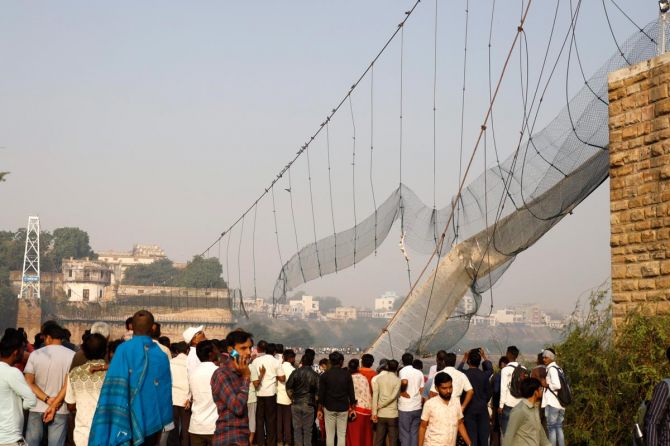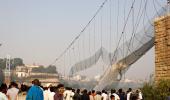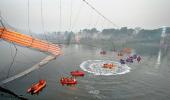Terming the Morbi bridge collapse that claimed 141 lives an ”enormous tragedy”, the Supreme Court on Monday asked the Gujarat high court to periodically monitor the probe and other aspects including rehabilitation and award of ”dignified” compensation to the victims.

A bench comprising Chief Justice D Y Chandrachud and Justice Hima Kohli also turned down the submissions that a commission of inquiry be appointed to ensure that incidents like the Morbi collapse do not happen again.
”Sometimes, the commission would just put the issue to the back burner. Sometimes, it is good for the judges to take charge of the proceedings. We would have done it ourselves but now the high court chief justice is dealing with it,” it said.
”It is an enormous tragedy and this will require a weekly monitoring to see award of contract, credentials of party awarded the contract, attribution of responsibility for those guilty. The high court has taken charge else we would have issued notice,” the bench orally observed during a hearing. The bench also said it would request the high court to hold periodical hearings.
The top court refused to entertain the pleas including a PIL seeking an independent probe into the incident, saying the division bench headed by the Gujarat high court chief justice has already taken a suo motu (on its own) note of the tragedy and has passed several orders.
It, however, permitted the PIL petitioner, Vishal Tiwari and another litigant Chavada Dilipbhai, who lost his brother and the sister-in-law in the incident, to move the high court with their pleas seeking an independent probe and award of dignified compensation to those who lost their family members.
The top court also said the petitioners may approach it later.
”As many as 141 persons including 47 children are reported to have perished in the Morbi bridge collapse. Several aspects of the matter would require obtaining periodical responses from the officials of the state and nagarpalika in order that the court is apprised of the antecedent facts leading up to the collapse of the bridge as well as the subsequent developments bearing on relief and rehabilitation and compensation,” it said.
The British-era bridge on the Machchhu river in Morbi in Gujarat collapsed on October 30 leaving 141 people dead.
The bench, in its order, said the high court would ”undoubtedly” ensure that a ”proper regulatory mechanism” is put in place so that such incidents do not recur.
”Since the division bench presided over by the Gujarat High Court Chief Justice has already entertained the suo motu proceedings, we are of the view that it would be appropriate that the conduct of the proceedings continue to remain with that division bench of the high court."
The bench also said that in addition, the high court would also give its ”time and attention” on other aspects of the bridge collapse relating to affixing responsibility, making arrests and award of dignified compensation to the victims and their family members.
The bench noted the submissions raised by senior advocate Gopal Sankarnarayanan on issues including on the ”need for an independent investigation on acts/omissions which would amount to criminal wrongdoing”.
The senior lawyer said there was a need to ”affix responsibility against officials of the nagarpalika”.
He said there was also a need to ensure that the agency which was entrusted with the task of maintaining the bridge and its management are held accountable.
The award of reasonable compensation to the heirs of those who have lost lives in the tragedy should also be taken up, the lawyer said.
The court said it would allow the petitioner either to institute a petition under Article 226 of the Constitution before the high court or to intervene in the suo motu proceedings by raising appropriate contention before the high court.
”Should it become necessary at any stage to move this court at a later date, liberty is granted to the petitioner or any other aggrieved individual to do so. At this stage, we dispose off the proceedings leaving it open to pursue the remedy before the high court. Since the high court is already seized of the suo motu proceedings, we request the high court to take the case on a periodical basis,” the court said in its order.
At the outset, Solicitor General Tushar Mehta, appearing for the Gujarat government, said the high court has suo motu taken note of the incident and that the state has been assisting the bench in a non-adversarial manner.
Sankaranarayanan said his client has lost his brother and the sister-in-law who has left behind a 9-year-old child, and that ”no big fish” has been caught.
”Moreover, a watch manufacturer was allowed to maintain the bridge. There are also upcoming elections and that is why it is important to catch the big fish like Ajanta Oreva,” he said, adding that the compensation of Rs 6 lakh given to the victim families was inadequate.
Mehta, on the other hand, said since the Gujarat high court is seized of a case relating to the incident, there was no reason for the top court to entertain petitions on the matter.
The law officer also urged the top court to say in its order that it was not making any observations as they may be capable of being misunderstood.
Sankaranarayanan said that anything can be misunderstood and moreover the bench has only recorded his submissions in the case.











 © 2025
© 2025